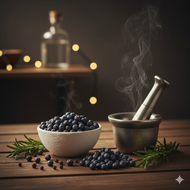Beyond the G&T: A Culinary Guide to Juniper Berries
Posted by Reese Colbert on 13th Oct 2025
Beyond the G&T: A Culinary Guide to Juniper Berries
For most people, the flavour of juniper is inextricably linked to one thing: the crisp, botanical bite of a gin and tonic. And for good reason—by law, gin must have a predominant flavour of juniper. But to limit this remarkable spice to the world of cocktails is to miss out on a rich culinary history and a world of flavour that extends far beyond the bar.
These small, dark orbs are not just "gin berries"; they are a versatile and potent spice with a legacy of flavouring hearty European dishes for centuries. Today, we're exploring the true character of Juniper Berries, from their pine-scented origins to their perfect pairings in the kitchen.
The Flavour of the Forest
Juniper berries are not true berries at all, but rather the fleshy seed cones of the juniper tree. Their flavour is a direct reflection of the coniferous forests where they grow. A single crushed berry releases a wave of aromas and tastes:
- Piney and Resinous: This is the dominant, most recognizable note, instantly reminiscent of a fresh pine forest and, of course, gin.
- Peppery and Spicy: Beneath the pine, there's a sharp, clean, peppery kick.
- Citrusy Brightness: A subtle, bright note of citrus adds a refreshing complexity.
This combination of woody, spicy, and fresh notes makes juniper a powerful flavouring agent, particularly adept at cutting through and complementing rich, fatty, and gamey foods.
The Golden Rule: Crush Before Use
If you learn only one thing about cooking with juniper, let it be this: you must crush the berries before you use them. The hard, dried exterior of the berry holds all the aromatic essential oils captive. Simply tossing them into a dish whole will impart very little flavour.
The method is simple. Just before you're ready to cook, take the number of berries you need (a little goes a long way) and give them a firm press with the flat side of a large knife, in a mortar and pestle, or even with the back of a spoon. You're not looking to pulverize them into dust, just to crack them open. The moment you do, you'll be rewarded with their incredible, fresh aroma—a sure sign they're ready to work their magic.
Classic Culinary Pairings for Juniper
In traditional European cuisine, especially in Alpine and Scandinavian regions, juniper is the go-to spice for taming and enhancing strong flavours.
Game Meats:
This is juniper's most famous culinary pairing. The sharp, clean flavour of juniper is the perfect foil for the rich, strong taste of game meats like venison, duck, boar, and rabbit.
- Try this: Create a simple rub for venison steaks by grinding 1 tablespoon of crushed Juniper Berries with salt, black pepper, and a little rosemary.
Rich, Fatty Meats:
Juniper's piney notes beautifully cut through the richness of fatty meats like pork belly or a hearty leg of lamb.
- Try this: Add 6-8 crushed juniper berries to the pot when slow-braising a pork shoulder or making a rich beef casserole.
Sauerkraut and Pickles:
Juniper is a traditional flavouring in many Northern European ferments and pickles. It adds a wonderful, aromatic complexity to homemade sauerkraut.
- Try this: Add a teaspoon of whole juniper berries to your jar of cabbage and salt before you begin the fermentation process for sauerkraut.
Beyond the Traditional: Modern Kitchen Uses
- Marinades and Brines: Add a handful of crushed berries to your favourite marinade or brine for chicken or pork to infuse it with a subtle, aromatic flavour.
- Seasoning Blends: Grind the berries to a fine powder and mix with salt, pepper, garlic powder, and other herbs to create a unique, all-purpose seasoning blend.
- Infused Syrups: Simmer crushed juniper berries in a simple sugar syrup to create a botanical syrup perfect for cocktails (even non-alcoholic ones) or for drizzling over fruit desserts.
A Spice Worth Rediscovering
Juniper berries are a fantastic spice to have in your culinary arsenal. They offer a direct line to the bold flavours of traditional European cooking and provide a unique aromatic dimension that other spices simply can't replicate. So next time you reach for the gin bottle, remember its star ingredient, and consider inviting the bold, beautiful flavour of juniper into your kitchen, too.

